DOHA, Qatar — Christian Pulisic has always appreciated the value of a good goal celebration. It’s a unique moment in soccer, a display of individual expression and euphoria—part choreography, part spontaneity—which occurs during that split second between the ball crossing the line and the crush of elated teammates.
Pulisic has a repertoire. He’s done the Griddy and the Worm, the latter honoring a cancer patient who requested it in March. Sometimes he’ll lift his left arm in front of his face to show off his tiger tattoo—it’s the Eye of the Tiger. Then there was the iconic “Man in the Mirror” undershirt, which Pulisic unveiled a year ago after scoring in an emphatic World Cup qualifying win over Mexico. The U.S. didn’t see El Tri when it looked in the mirror. It was now the other way around.
It’s tempting to wonder whether celebrations are just about glorifying the self, but that’s not what seems to drive Pulisic. If anything, spotlights and scrutiny leave him anxious. He is, by most accounts, reserved and generous. In a June friendly against Morocco, for example, Pulisic earned a second-half penalty kick but offered the shot to Haji Wright, a friend making his senior U.S. debut.
Pulisic was robbed Tuesday night of the chance to celebrate the biggest goal of his life, one that was surely similar to those he dreamed of scoring while growing up in Pennsylvania. This goal, the one that catapulted the U.S. men to a 1–0 win over Iran and this World Cup’s round of 16, required significant courage and resulted in an injury that sent him to a hospital here in the Qatari capital. The only way for Pulisic to reach Sergiño Dest’s headed cross in the 38th minute of their Group B finale was to sprint at full speed straight toward the spot where 6-foot-4 goalkeeper Alireza Beiranvand was going to be. A nasty collision was inevitable.
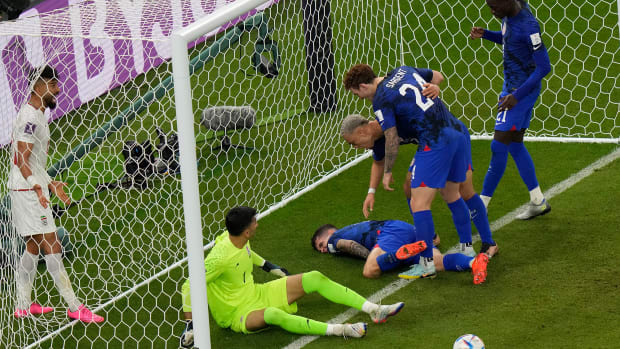
Luca Bruno/AP
“It just shows his bravery. I mean, you want it so bad. I'm glad that he was finally rewarded with a goal,” U.S. midfielder Kellyn Acosta said.
The moment just after the ball hit the net was spent in agony, and Pulisic was down on the goal line writhing and in pain for several minutes. Teammates rushed toward him not to smother him in joy but out of obvious concern for his wellbeing. U.S. Soccer said Pulisic suffered a “pelvic contusion” and was back at the team hotel on The Pearl, the man-made island in Doha’s northeast, before the rest of the group arrived from Al Thumama Stadium on the south side of the city. He’s “day-to-day,” according to U.S. Soccer, ahead of Saturday’s second-round game against the Netherlands.
Missing out on the goal celebration and Tuesday’s nail-biting second half, and perhaps putting the rest of his World Cup at risk, was the price to pay for one of the biggest goals in American soccer history. And it was emblematic of a match that demanded immense commitment from a young U.S. side that, once again, had the better of the play for long stretches.
World Cup 2022: Updated schedule and TV coverage.
But like prior games against Wales and England, Tuesday’s was a lot closer than it could’ve (or should’ve) been. The second half was tilted toward a desperate Team Melli, which needed just a draw to advance at the Americans’ expense. There would be no jubilation following Pulisic’s goal, and no procession to the round of 16. Over and over in the post-game interview area underneath Al Thumama, U.S. players referenced “suffering.” Tuesday’s win, which goes a long way toward validating the progress this acclaimed generation has made under coach Gregg Berhalter, was purchased with sweat and pain.
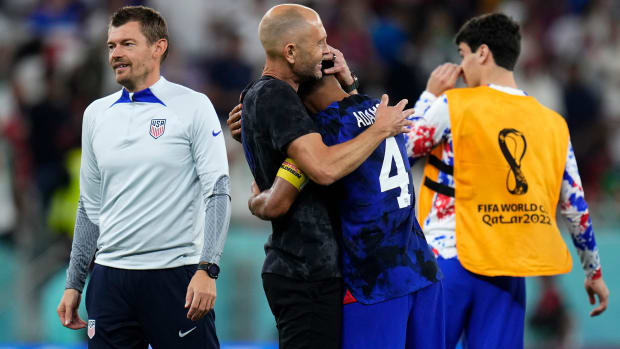
Manu Fernandez/AP
“The end of the game is really what I'm most proud of, because it's the mark of determination and an extreme amount of effort and resiliency to hang in there and get the win—not buckle,” Berhalter said. “You know, that's the first time in 92 years that we've gotten two shutouts at a World Cup. So the boys are doing something right.”
Berhalter’s starting lineup against Iran was the youngest at this World Cup, averaging just under 25 years of age (the U.S. has fielded the three youngest lineups in the tournament). It would be chasing the program’s sixth World Cup victory in the past 72 years. Nevertheless, despite their historic rarity, three points were expected at Al Thumama. Too much time and hype had been invested in this team. Escaping the group stage had been established, fairly or not, as the minimum expectation. And so the pressure, perhaps heightened by days of discourse about politics and protest, was intense.
“It was a difficult proposition, knowing that Iran could potentially just need a tie to go through. So that made the game a little bit complicated. But what I saw from the group was a tremendous amount of focus. Especially leading into the game, you could tell they're locked in,” Berhalter said.
The Americans came out flying, pinning back Iran and swarming its back five. Yunus Musah, who turned 20 on Tuesday, Tim Weah and Pulisic all had good looks in the first half hour. When Pulisic finally scored, it was deserved and a long-time coming, both on the night and in this tournament. Weston McKennie found Dest on the right, and the Iranian defense turned toward the AC Milan defender as Pulisic raced toward goal.
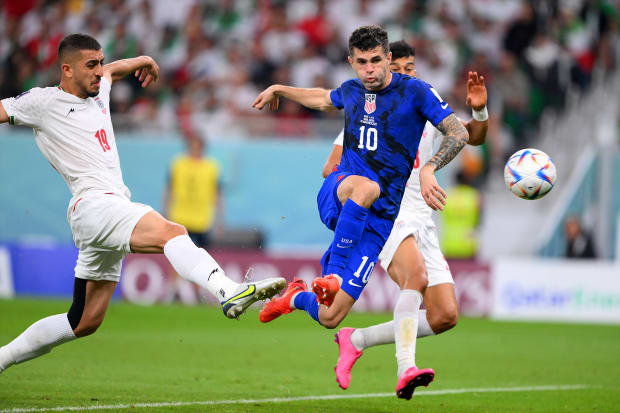
Ulmer/Teamfoto/Imago Images
“It was a good team goal,” McKennie said. “We knew that they would struggle with diagonal balls behind the back line, and that's something we've been working on. … It was good to see that it helped out and that we executed it to plan.”
Pulisic’s “Man in the Mirror” goal was similar—a quick burst toward the goal line, and through or over defenders, to meet a cross from the right.
“That’s what he does. That's the special quality he has. As soon as the ball is wide. He goes in with intensity into the penalty box and good things happen and you score goals,” Berhalter said. “He crashes the box and it makes it really difficult for defenders with his change of pace.”
Brenden Aaronson, who came on for Pulisic after halftime, said, “So brave. I mean, he scored the goal and that's the kind of guy he is.
“He scores a lot of goals like this, and I think that's a really underrated part of his game—how he makes this late run into the box and he's very good at that,” Aaronson continued. “So I'm really proud of him, and I'm just hoping that he's O.K.”
The Americans’ attacking and pressing structure looked a bit different once Aaronson entered, and Iran started to probe the U.S. left. Team Melli took additional risks, abandoning its conservative set-up, and the Americans began to sag. With cheers of “Iran! Iran!” booming through Al Thumama, captain Ehsan Hajsafi almost equalized with a 64th-minute curler. U.S. striker Josh Sargent was forced out with a potentially ugly injury to his right leg, and with about 20 minutes to go (plus an agonizing nine-plus minutes of stoppage time), Berhalter decided to shift to a 5-4-1 that might help secure the result. The Americans would cede possession and space. They would chase, lunge, tackle and suffer.
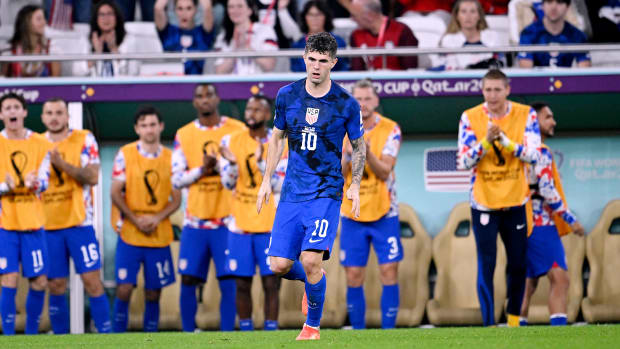
Laci Perenyi/Imago Images
“To finish out the game is just a lot of hard work, running back and forth, sliding, aerial duels, ground duels, kind of a combination of everyone just rolling up the sleeves and getting it done. The last 15 minutes were tough,” said Acosta, who relieved McKennie in the second half.
Around three minutes into stoppage time, Morteza Pouraliganji barely missed with a diving header. Shortly thereafter, Iran star Mehdi Taremi slid into U.S. goalkeeper Matt Turner and knocked the ball between his legs. It was heading in when Walker Zimmerman, who had subbed in as the fifth defender, cleared it. Iran lobbied for a penalty, claiming Cameron Carter-Vickers had pulled Taremi down. But the referee wasn’t interested. Every second felt like weeks.
“You suffer a lot during these games because that's part of the game,” said captain Tyler Adams, who was immense in the American midfield once again. “One goal can be very, very decisive. So how do you manage that? How do you kind of cope with the pressure? It’s obviously stressful, but one thing that we can count on in these moments is our defense. Our defense has been superb obviously. Two clean sheets in the group stages is huge for our team.”
Zimmerman said, “As defenders and goalkeepers, we’re lucky to have a group that's willing to suffer and put in the work defensively. That makes our job easier and it’s a full team effort when you accomplish something like that.”
They were spent, but the pride and satisfaction was evident. Suffering to hold a lead feels a lot better than chasing the game.
“You have to enjoy that adversity,” center back Tim Ream said. “You have to enjoy the pressure that comes with a team throwing everything at you. If you don't enjoy it and you start panicking, then bad things happen. I looked around and saw 11 calm guys on the field doing everything they could, putting their bodies on the line to make sure that result stuck—and what a fantastic result it is.”
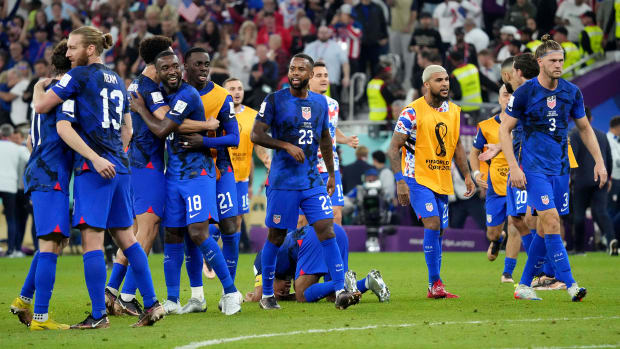
Li Gang/Xinhua/Imago Images
Pulisic was shown in a short video tweeted by U.S. Soccer smiling and greeting his teammates back at the hotel. The hugs he’d earned in the first half were just delayed. Now comes three days of rest and recuperation before the U.S. meets the Netherlands, a three-time World Cup runner-up that’s ranked eighth by FIFA, in Al Rayyan (England won Group B by beating Wales and will face Senegal in the second round). It’s another short turnaround for the Americans, with a high hurdle to come. But there’s a confidence and fearlessness about this group that should provide a boost, not to mention its faith in the determination and resolve that was tested on Tuesday.
McKennie said he was convinced Pulisic would be ready.
“Obviously we have 26 players here on the roster, and every single player is willing to lay their body on the line to make sure this team’s successful,” the midfielder said. “I sent him a text and checked on him and he said, ‘Best believe I'll be ready on Saturday.’”
And the U.S. will be as well, emboldened by its suffering.
“Having a win where we had to suffer a lot because in the next game we play against the Netherlands and it probably might take the same thing,” McKennie said. “Whenever it comes down to game time against the Netherlands, we can all have that look back on what it took to get here. Not just the past four years, but this game against Iran.
“We’ll definitely look back and see what it took and remember it and use it as fuel.”







